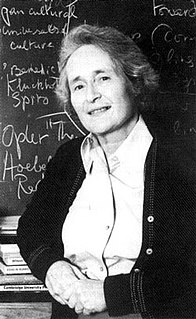A Quote by Barbara Grizzuti Harrison
Persecution always acts as a jell for members of cults; it proves to them, in the absence of history, liturgy, tradition, and doctrine, that they are God's chosen.
Related Quotes
Political as well as religious cults can be distinguished from legitimate organizations by their use of doublethink. Though political cults espouse extremist ideologies, not extremist theologies, operationally they are virtually identical to religious cults, and they also go to great lengths to control the vocabularies of their members.
As a form of moral insurance, at least, literature is much more dependable than a system of beliefs or a philosophical doctrine. Since there are no laws that can protect us from ourselves, no criminal code is capable of preventing a true crime against literature; though we can condemn the material suppression of literature - the persecution of writers, acts of censorship, the burning of books - we are powerless when it comes to its worst violation: that of not reading the books. For that crime, a person pays with his whole life; if the offender is a nation, it pays with its history.
I don’t know much about history, and I wouldn’t give a nickel for all the history in the world. It means nothing to me. History is more or less bunk. It's tradition. We don't want tradition. We want to live in the present and the only history that is worth a tinker's damn is the history we make today.
I believe the doctrine of election, because I am quite sure that if God had not chosen me I should never have chosen him; and I am sure he chose me before I was born, or else he never would have chosen me afterwards; and he must have elected me for reasons unknown to me, for I never could find any reason in myself why he should have looked upon me with special love.
Is it our task to force the biblical doctrine of God to answer to modern culture, or (is it our task) to address modern culture with the biblical doctrine of God? If modern culture-or any culture-establishes the baseline for the doctrine of God, such a doctrine will certainly bear little resemblance to the God of the Bible.






































